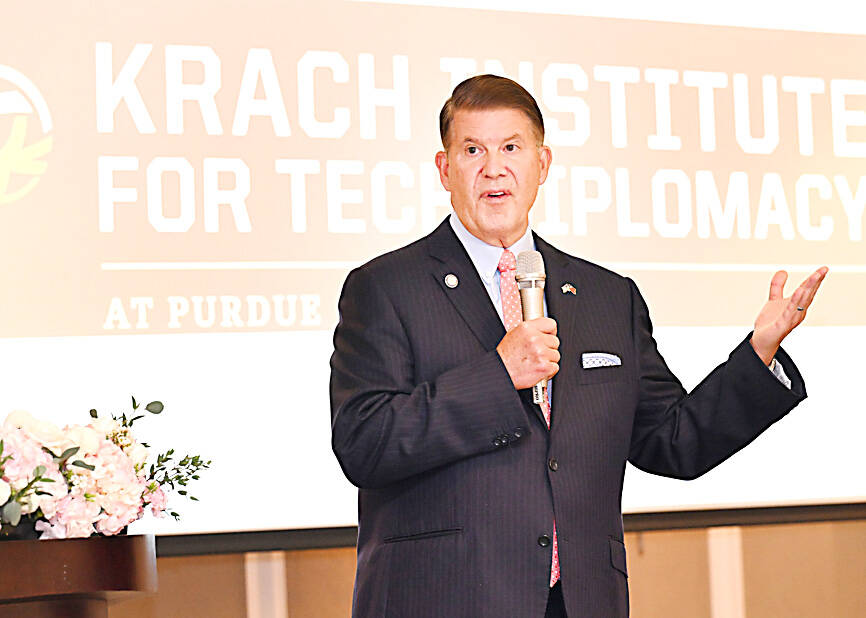Purdue University is launching a center to advocate for Taiwan as a trusted partner and encourage US investment in the nation, former US undersecretary of state for economic growth, energy and the environment Keith Krach told a news conference in Taipei yesterday.
Krach, chairman of the Krach Institute for Tech Diplomacy at Purdue, first announced plans for the establishment of the Taiwan Center for Innovation and Prosperity before his arrival in Taiwan on Wednesday for a four-day visit.
The center would be a partnership between public and private sectors in the US and Taiwan to “advocate for Taiwan internationally and attract more global partners,” the institute said.

Photo: Tien Yu-hua, Taipei Times
While Western firms are pulling out of China due to security concerns, Taiwan has great opportunities to attract investment with its skilled labor force and a friendly government, Krach said.
The center hopes to facilitate such cooperation, as well as help foster and strengthen customer relationships as, for example, more than half of Taiwan Semiconductor Manufacturing Co’s customer base is in the US, he said.
The partnership also looks to address the shortage of skilled labor, a topic he discussed extensively with President Tsai Ing-wen (蔡英文) during their meeting, Krach said.
Purdue is the only university that offers bachelor’s, master’s and doctorate programs in semiconductor engineering and is a top university in national security research, he said.
By signing memorandums of understanding with National Chengchi University and National Yang Ming Chiao Tung University, the center is to provide tech diplomacy training for the private sector as well as diplomats, he said.
It is also to accelerate innovation, from research to development and adoption of trusted technology with its venture capital capabilities and mentor network, he added.
US President Joe Biden last year signed the Creating Helpful Incentives to Produce Semiconductors (CHIPS) and Science Act, which provides billions of US dollars for research in critical national security sectors such as biotechnology, cybersecurity, autonomous vehicles and aerospace.
“I think the opportunities for Taiwan to participate in that is huge,” Krach said.
Krach is also chairman of the Global Tech Security Commission, where Minister of Digital Affairs Audrey Tang (唐鳳) serves as a commissioner as Taiwan’s representative.
Tang is going to “play a pivotal role” in developing a set of trusted tech standards, Krach said.
Asked about Taiwan’s presidential election in January next year, Krach said that he hoped Taiwanese can select a transformational leader who has courage, like President Tsai.
“All eyes are on Taiwan. Taiwan is the linchpin of democracy,” he said. “I think if there’s anything that I’ve learned from the people of Taiwan, there is no prosperity without freedom.”

Taiwan is stepping up plans to create self-sufficient supply chains for combat drones and increase foreign orders from the US to counter China’s numerical superiority, a defense official said on Saturday. Commenting on condition of anonymity, the official said the nation’s armed forces are in agreement with US Admiral Samuel Paparo’s assessment that Taiwan’s military must be prepared to turn the nation’s waters into a “hellscape” for the Chinese People’s Liberation Army (PLA). Paparo, the commander of the US Indo-Pacific Command, reiterated the concept during a Congressional hearing in Washington on Wednesday. He first coined the term in a security conference last

Prosecutors today declined to say who was questioned regarding alleged forgery on petitions to recall Democratic Progressive Party (DPP) legislators, after Chinese-language media earlier reported that members of the Chinese Nationalist Party (KMT) Youth League were brought in for questioning. The Ministry of Justice Investigation Bureau confirmed that two people had been questioned, but did not disclose any further information about the ongoing investigation. KMT Youth League members Lee Hsiao-liang (李孝亮) and Liu Szu-yin (劉思吟) — who are leading the effort to recall DPP caucus chief executive Rosalia Wu (吳思瑤) and Legislator Wu Pei-yi (吳沛憶) — both posted on Facebook saying: “I

The Ministry of Economic Affairs has fined Taobao NT$1.2 million (US$36,912) for advertisements that exceed its approved business scope, requiring the Chinese e-commerce platform to make corrections in the first half of this year or its license may be revoked. Lawmakers have called for stricter enforcement of Chinese e-commerce platforms and measures to prevent China from laundering its goods through Taiwan in response to US President Donald Trump’s heavy tariffs on China. The Legislative Yuan’s Finance Committee met today to discuss policies to prevent China from dumping goods in Taiwan, inviting government agencies to report. Democratic Progressive Party Legislator Kuo Kuo-wen (郭國文) said

The Ministry of Economic Affairs has fined Taobao NT$1.2 million (US$36,900) for advertisements that exceeded its approved business scope and ordered the Chinese e-commerce platform to make corrections in the first half of this year or its license would be revoked. Lawmakers have called for stricter supervision of Chinese e-commerce platforms and more stringent measures to prevent China from laundering its goods through Taiwan as US President Donald Trump’s administration cracks down on origin laundering. The legislature’s Finance Committee yesterday met to discuss policies to prevent China from dumping goods in Taiwan, inviting government agencies to report on the matter. Democratic Progressive Party